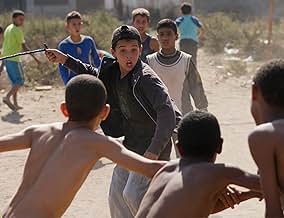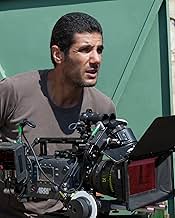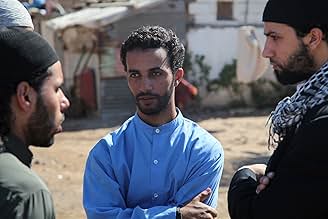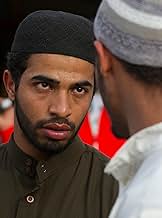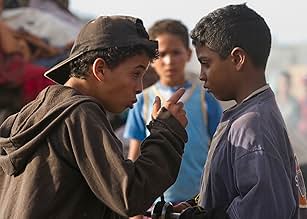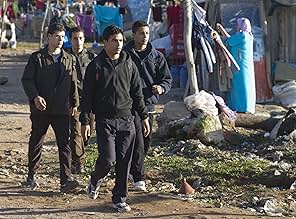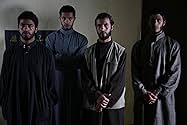NOTE IMDb
7,3/10
2,1 k
MA NOTE
Ajouter une intrigue dans votre langueA fictional account of the lives of the men responsible for the suicide bombings in Casablanca in 2003.A fictional account of the lives of the men responsible for the suicide bombings in Casablanca in 2003.A fictional account of the lives of the men responsible for the suicide bombings in Casablanca in 2003.
- Réalisation
- Scénario
- Casting principal
- Récompenses
- 10 victoires et 5 nominations au total
Abdelhakim Rachid
- Yachine
- (as Abdelhakim Rachi)
- …
Rabii Benjhail Tadlaoui
- Zaid
- (as Rabii Tadlaoui)
Avis à la une
A difficult film to review objectively because of the content. It was extremely well done whatever your reaction might be to the story that was told. For those open to the excellent message contained in this film, it would be well worthwhile to watch. To those who see the world solely in black & white, it may, unfortunately, further fuel their prejudices
The story begins with a group of boys born and raised in the squalor of a Moroccan slum. Their lives are shaped by poverty, exploitation within their own community, harassment by the police and indifference to their plight from the government. They develop into young men who have little hope for the future, who use & deal drugs, who get drunk and into fights, who commit crimes & have no hope of meaningful employment, who are harassed & exploited by the police, and who in some cases are put in prison.
At this point in the story some of the young men are rescued ( or further exploited, depending on your point of view) by a group of Muslim men. The young men become part of a community that support & care for one another, pray & receive religious instruction, stop their anti-social behavior, cease committing petty crimes and seem on the road to being model citizens.
But then their education goes beyond the fundamentals of Islam and they learn of the persecution of others of their faith around the world. They are trained in hand to hand combat and indoctrinated with the view that martyrdom for the faith and for the defense of their people is an honorable objective that will ensure their entry into paradise and provide comfort to their families in this life.
To western minds this would appear to be mindless extremism and sacrifice but to be fair virtually every nation and every ideology fights its battles with armies recruited from poor, under-educated young men who have few prospects for the good life experienced by those who want to use them to defend their comfortable status quo or who want them to sacrifice themselves for some cause from which they, the recruiters, would reap the rewards. Whether the exploiters glorify the prospect of an honorable death for king & country, for democracy, for democratic freedom or for religious survival, it amounts to the same thing attracting the disenfranchised through propaganda and short-term rewards to fight and die while those who reap the potential benefits stay out of harm's way.
The message of the film may help some to better understand the circumstances that inspire the recruitment of Islamic fundamentalists who are willing to become martyrs for their faith, but more generally it should open some eyes to the exploitation of marginalized, disaffected people for some "grand cause," whether it is supposedly to preserve a western capitalistic way of life (though certainly not a life enjoyed by most of those recruited) or to restore lost glory (as was twice the case in Germany) or supposedly at the behest of the semi-divine emperor of Japan or to defend the faith as in the crusades or Israeli conflicts and so on throughout history. Glorifying sacrifice from those who have little to lose, by those who have much to gain, is neither unique to Islamic fundamentalists nor to the 21st century. The conditions that produce the ready supply of recruits used to wage wars and terrorism are nothing new either.
Definitely a thought-provoking, well produced film.
The story begins with a group of boys born and raised in the squalor of a Moroccan slum. Their lives are shaped by poverty, exploitation within their own community, harassment by the police and indifference to their plight from the government. They develop into young men who have little hope for the future, who use & deal drugs, who get drunk and into fights, who commit crimes & have no hope of meaningful employment, who are harassed & exploited by the police, and who in some cases are put in prison.
At this point in the story some of the young men are rescued ( or further exploited, depending on your point of view) by a group of Muslim men. The young men become part of a community that support & care for one another, pray & receive religious instruction, stop their anti-social behavior, cease committing petty crimes and seem on the road to being model citizens.
But then their education goes beyond the fundamentals of Islam and they learn of the persecution of others of their faith around the world. They are trained in hand to hand combat and indoctrinated with the view that martyrdom for the faith and for the defense of their people is an honorable objective that will ensure their entry into paradise and provide comfort to their families in this life.
To western minds this would appear to be mindless extremism and sacrifice but to be fair virtually every nation and every ideology fights its battles with armies recruited from poor, under-educated young men who have few prospects for the good life experienced by those who want to use them to defend their comfortable status quo or who want them to sacrifice themselves for some cause from which they, the recruiters, would reap the rewards. Whether the exploiters glorify the prospect of an honorable death for king & country, for democracy, for democratic freedom or for religious survival, it amounts to the same thing attracting the disenfranchised through propaganda and short-term rewards to fight and die while those who reap the potential benefits stay out of harm's way.
The message of the film may help some to better understand the circumstances that inspire the recruitment of Islamic fundamentalists who are willing to become martyrs for their faith, but more generally it should open some eyes to the exploitation of marginalized, disaffected people for some "grand cause," whether it is supposedly to preserve a western capitalistic way of life (though certainly not a life enjoyed by most of those recruited) or to restore lost glory (as was twice the case in Germany) or supposedly at the behest of the semi-divine emperor of Japan or to defend the faith as in the crusades or Israeli conflicts and so on throughout history. Glorifying sacrifice from those who have little to lose, by those who have much to gain, is neither unique to Islamic fundamentalists nor to the 21st century. The conditions that produce the ready supply of recruits used to wage wars and terrorism are nothing new either.
Definitely a thought-provoking, well produced film.
Based on the real multiple bombings that took place on May 16, 2003 in Casablanca, Morocco, the film follows its main characters over a period of 10 years, as they transition from boys to young men.
There's a lot that's powerful here, and there is much that has the ring of truth in this journey into darkness. But compared to (for example), Hany Abu-Assad's more complex and richer 'Paradise Now' there's also something a bit schematic. The reasons behind the transformation of these once sweet young men into bombers– poverty, hopelessness, an overly macho culture – are certainly true, but they're also familiar. It doesn't quite feel like we're digging deeper into their souls.
I also wish the villains of the piece, both Jihadist and 'civilian' were a little less on-the-nose, a little less mustache twirling. In terms of those men who are recruiting the boys, I missed the charisma that I assume must be part of the recruitment process.
Much like Ayouch's earlier 'Ali Zoaua: Price of the Streets', also about middle -eastern street kids, while the film is intelligent and interesting, it feels like it should be even more emotionally devastating than it ultimately is. That said, it's good enough that I could imagine re-visiting it, and seeing if it pulls me in even deeper on a second viewing.
There's a lot that's powerful here, and there is much that has the ring of truth in this journey into darkness. But compared to (for example), Hany Abu-Assad's more complex and richer 'Paradise Now' there's also something a bit schematic. The reasons behind the transformation of these once sweet young men into bombers– poverty, hopelessness, an overly macho culture – are certainly true, but they're also familiar. It doesn't quite feel like we're digging deeper into their souls.
I also wish the villains of the piece, both Jihadist and 'civilian' were a little less on-the-nose, a little less mustache twirling. In terms of those men who are recruiting the boys, I missed the charisma that I assume must be part of the recruitment process.
Much like Ayouch's earlier 'Ali Zoaua: Price of the Streets', also about middle -eastern street kids, while the film is intelligent and interesting, it feels like it should be even more emotionally devastating than it ultimately is. That said, it's good enough that I could imagine re-visiting it, and seeing if it pulls me in even deeper on a second viewing.
The cinematic piece offers a breath of fresh air when it comes to the stigmatized dehumanization of muslim youth, and brings to light the root of the issue instead of the unreconsilable outcome.
The terrorist bombings in the Moroccan city of Casablanca didn't get as much attention as those in New York, London or Madrid. The five attacks were aimed at western and Jewish targets, killed 45 people, and were carried out by Moroccans, all of them young men from Sidi Moumen, a nearby slum. The attacks came as a shock, because for an Arab country, Morocco is considered rather moderate and open-minded. So why did these young terrorists carry out such gruesome attacks in their own city?
The film 'Le chevaux de Dieu' (God's Horses) tries to answer that question, and does it in an impressive way. For the most part, the film shows the daily life of young men in the slums. It is a cruel environment, an urban jungle full of violence, drugs, alcohol, corruption and extortion. And above all: without any hope. It is this desperate life that provides the fertile ground for frustration and rebellion.
The film shows clearly that the young men at no point deliberately choose for Muslim fundamentalism. One of them is arrested for throwing a stone to a police car and returns from prison as a faithful Muslim. Another kills his boss to prevent a rape, and is told by the religious community that God forgives him, provided that he starts praying and believing in Allah.
For the young slum dwellers, faith and religion is a tempting way of life. It preaches forgiveness, whereas the slum is full of violence. It is clear and deliberate, not chaotic like slum life. Its most important feature is discipline, which is in stark contrast with the loose morals in the slum dwellings.
The young men are fascinated by the Muslim organization. Slowly their lives are getting controlled by it. When the leader tells them they are selected for a special assignment, they feel honoured. Even when it becomes clear what this assignment is, most of them don't hesitate for a second.
The film doesn't approve of Muslim fundamentalism in any way. It merely shows the mechanics of it. That's why it is such a good movie. Watching the young men being absorbed by their religion, you almost pity them. But most of all, you understand why they do what they do. That's more than most other post-9/11 films have accomplished.
Moreover, the acting is incredibly subtle, and the cinematography is so effective that, at the end of the film you think you know the Sidi Moumen neighbourhood really well. When you go watch the movie, pay attention to the last shot; it is a beauty. In an amazing traveling shot, the camera circles around a group of kids playing football in the slums and watching the fatal explosion in the distance. Then, without cutting, the camera pans towards a cliff, we see the ball falling down and disappearing in the darkness. 'Le chevaux de Dieu' is a gem, and it would be a pity if it stays unnoticed by western audiences.
The film 'Le chevaux de Dieu' (God's Horses) tries to answer that question, and does it in an impressive way. For the most part, the film shows the daily life of young men in the slums. It is a cruel environment, an urban jungle full of violence, drugs, alcohol, corruption and extortion. And above all: without any hope. It is this desperate life that provides the fertile ground for frustration and rebellion.
The film shows clearly that the young men at no point deliberately choose for Muslim fundamentalism. One of them is arrested for throwing a stone to a police car and returns from prison as a faithful Muslim. Another kills his boss to prevent a rape, and is told by the religious community that God forgives him, provided that he starts praying and believing in Allah.
For the young slum dwellers, faith and religion is a tempting way of life. It preaches forgiveness, whereas the slum is full of violence. It is clear and deliberate, not chaotic like slum life. Its most important feature is discipline, which is in stark contrast with the loose morals in the slum dwellings.
The young men are fascinated by the Muslim organization. Slowly their lives are getting controlled by it. When the leader tells them they are selected for a special assignment, they feel honoured. Even when it becomes clear what this assignment is, most of them don't hesitate for a second.
The film doesn't approve of Muslim fundamentalism in any way. It merely shows the mechanics of it. That's why it is such a good movie. Watching the young men being absorbed by their religion, you almost pity them. But most of all, you understand why they do what they do. That's more than most other post-9/11 films have accomplished.
Moreover, the acting is incredibly subtle, and the cinematography is so effective that, at the end of the film you think you know the Sidi Moumen neighbourhood really well. When you go watch the movie, pay attention to the last shot; it is a beauty. In an amazing traveling shot, the camera circles around a group of kids playing football in the slums and watching the fatal explosion in the distance. Then, without cutting, the camera pans towards a cliff, we see the ball falling down and disappearing in the darkness. 'Le chevaux de Dieu' is a gem, and it would be a pity if it stays unnoticed by western audiences.
I finally found a version of this film that was not dubbed into French! Over the years I have downloaded, rented and started watching it but gave up as the language was not the original Darija.
I watched the film with a sense of mounting horror and despair. There was not a moment of fat in this feature that told the story of various youths and their families' lives in the sprawling slum of Sidi Moumen. The shantytown had been allowed to exist and enlarge during "Les Années de Plomb" (the years of lead) under the careless watch of King Hassan ll. There is no way out apart from crime, prostitution or marriage to a rich person if one is good looking.
We see the lives of the protagonists from childhood through to the atrocities and how they are twisted and formed by the utter hopelessness of their situation. The local Mafias act on behalf of the cops until the latter decide an arrest is needed, then someone is casually thrown in jail. One of these is Hamid, rough elder brother of Tarek who is ensnared by radical Islam in the klink. Unfolding events trap others too, including Tarek and his friends.
There is a theme throughout the film of hidden homosexuality. Nabil is raped as a preteen and is Tarek's lover later when they are teens despite the latter being in love with Ghislaine, a local beauty. The repair shop's boss tries it on with Nabil too and this is the beginning of the lads' descent into fundamentalism. It's quite subtly done in the film. This is Morocco after all and such things are not spoken about.
The radicalisers are grotesquely true to life in their way of caging and channeling their victims into believing that martyrdom while killing apostates and non-Muslims is acceptable, nay desirable. Of course, they would never go on a mission themselves.
The part that made me weep was when the lads were taken on a solidarity holiday to the mountains just before their mission. These young men were not evil, they were kids who had been deluded and deceived, splashing in mountain streams that they had never had the opportunity to see before and playing football. They had been seduced to terrible effect.
And now I have to declare my interest. I live in Morocco although not in Casablanca. The new tramway extends all the way to Sidi Moumen giving new opportunities to the remaining slums. Morocco has clamped down on jihadists using a network of spies and informers. However, I was by chance in Casablanca the night of the attacks, staying in a hotel 200 yards away from the Safir which was partially blown up. Like an idiot, having heard the explosion from my hotel, I went out to see what had happened. I got about 40 yards down the street before I was lifted off my feet by two burly cops and dragged back to my hotel and slapped hard once they had got me into reception.
I was bewildered ever since and have never truly understood the attraction of being radicalised, either these guys or other terrorists elsewhere. This masterpiece of a film goes a long way to explaining the process to me.
I watched the film with a sense of mounting horror and despair. There was not a moment of fat in this feature that told the story of various youths and their families' lives in the sprawling slum of Sidi Moumen. The shantytown had been allowed to exist and enlarge during "Les Années de Plomb" (the years of lead) under the careless watch of King Hassan ll. There is no way out apart from crime, prostitution or marriage to a rich person if one is good looking.
We see the lives of the protagonists from childhood through to the atrocities and how they are twisted and formed by the utter hopelessness of their situation. The local Mafias act on behalf of the cops until the latter decide an arrest is needed, then someone is casually thrown in jail. One of these is Hamid, rough elder brother of Tarek who is ensnared by radical Islam in the klink. Unfolding events trap others too, including Tarek and his friends.
There is a theme throughout the film of hidden homosexuality. Nabil is raped as a preteen and is Tarek's lover later when they are teens despite the latter being in love with Ghislaine, a local beauty. The repair shop's boss tries it on with Nabil too and this is the beginning of the lads' descent into fundamentalism. It's quite subtly done in the film. This is Morocco after all and such things are not spoken about.
The radicalisers are grotesquely true to life in their way of caging and channeling their victims into believing that martyrdom while killing apostates and non-Muslims is acceptable, nay desirable. Of course, they would never go on a mission themselves.
The part that made me weep was when the lads were taken on a solidarity holiday to the mountains just before their mission. These young men were not evil, they were kids who had been deluded and deceived, splashing in mountain streams that they had never had the opportunity to see before and playing football. They had been seduced to terrible effect.
And now I have to declare my interest. I live in Morocco although not in Casablanca. The new tramway extends all the way to Sidi Moumen giving new opportunities to the remaining slums. Morocco has clamped down on jihadists using a network of spies and informers. However, I was by chance in Casablanca the night of the attacks, staying in a hotel 200 yards away from the Safir which was partially blown up. Like an idiot, having heard the explosion from my hotel, I went out to see what had happened. I got about 40 yards down the street before I was lifted off my feet by two burly cops and dragged back to my hotel and slapped hard once they had got me into reception.
I was bewildered ever since and have never truly understood the attraction of being radicalised, either these guys or other terrorists elsewhere. This masterpiece of a film goes a long way to explaining the process to me.
Le saviez-vous
- AnecdotesOfficial submission of Morocco to the Oscars 2014 best foreign language film category.
- Bandes originalesGouli je t'aime
by Youmni Rabii & City 16
Lyricst & Composer - Youmni Abdellatif
Les chevaux de Dieu (Bande originale du film)
©Les Films du Nouveau Monde, 2013
Meilleurs choix
Connectez-vous pour évaluer et suivre la liste de favoris afin de recevoir des recommandations personnalisées
- How long is Horses of God?Alimenté par Alexa
Détails
Box-office
- Budget
- 3 000 000 $US (estimé)
- Montant brut aux États-Unis et au Canada
- 14 817 $US
- Week-end de sortie aux États-Unis et au Canada
- 2 251 $US
- 18 mai 2014
- Montant brut mondial
- 96 277 $US
- Durée
- 1h 55min(115 min)
- Couleur
- Mixage
- Rapport de forme
- 1.85 : 1
Contribuer à cette page
Suggérer une modification ou ajouter du contenu manquant


